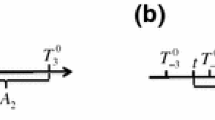Abstract
In this paper, we explore algorithms for perfect and nearly perfect sampling from the stationary distribution of the waiting times in various Poisson arrival multi-class and multi-server queues with non-preemptive work-conserving service disciplines. The service duration distributions of these classes may be identical or may vary from class to class. The algorithms follow the idea of dominated coupling from the past (Kendall, Adv Appl Probab 32:844–865 2000) and are variations on an algorithm of Sigman (J Appl Prob 48A:37–43, 2011). A coupled first come first serve queue is constructed for each work-conserving queue. When the service duration distributions do not vary, we achieve perfect simulation by finding times when the system is known to be totally idle. When the distributions differ, the totally idle times may be impossible to determine exactly, but we can achieve simulations with a specified error limit \(\epsilon > 0\).



Similar content being viewed by others
References
Abate, J., Whitt, W.: Transient behavior of the \(M/M/1\) queue: starting at the origin. Queueing Syst. 2, 41–65 (1987)
Abate, J., Whitt, W.: Transient behavior of the \(M/G/1\) workload process. Oper. Res. 42, 750–764 (1994)
Asmussen, S.: Applied Probability and Queues, 2nd edn. Springer, New York (2003)
Asmussen, S., Glynn, P.W.: Stochastic Simulation: Algorithms and Analysis. Springer, New York (2007)
Blanchet, J., Dong, J.: Perfect sampling for infinite server and loss systems. Forthcoming in Adv. Appl. Probab. (2014)
Boxma, O.J.: The longest service time in a busy period. Math. Methods Oper. Res. 24, 235–242 (1980)
Bušić, A., Gaujal, B., Perronnin, F.: Perfect sampling of networks with finite and infinite capacity queues. AMSTA, LNCS 7314, 136–149 (2012)
Canadian Association of Emergency Physicians. The Canadian Triage and Acuity Scale (2013).http://caep.ca/resources/ctas
Connor, S.B., Kendall, W.S.: Perfect simulation of M/G/c queues. arXiv:1402.7248v1 (2014)
Gross, D., Harris, C.M.: Fundamentals of Queueing Theory, 3rd edn. Wiley, New Jerssey (1998)
Hoeffding, W.: Probability inequalities for sums of bounded random variables. J. Am. Stat. Assoc. 58, 13–30 (1963)
Kendall, W.S., Møller, J.: Perfect simulation using dominating processes on ordered spaces, with application to locally stable point processes. Adv. Appl. Probab. 32, 844–865 (2000)
Kleinrock, L.: A delay dependent queue discipline. Naval Res. Logist. Quart. 11, 329–341 (1964)
Kleinrock, L.: Queueing Systems Volume 1: Theory. Wiley, New Jerssey (1975)
Kleinrock, L.: Queueing Systems Volume 2: Computer Applications. Wiley, New Jerssey (1976)
Klugman, S.A., Panjer, H.H., Willmot, G.E.: Loss Models : From Data to Decisions, 3rd edn. Wiley, New Jerssey (2008)
Propp, J.G., Wilson, D.B.: Exact sampling with coupled Markov chains and applications to statistical mechanics. Random Struct. Algorithms 9, 223–252 (1996)
Ross, S.M.: Stochastic Processes, 2nd edn. Wiley, New Jerssey (1996)
Sharif, A.B., Stanford, D.A., Taylor, P., Ziedins, I.: A multi-class multi-server accumulating priority queue with application to health care. Oper. Res. Health Care (2014). doi:10.1016/j.orhc.2014.01.002
Sigman, K.: Exact simulation of the stationary distribution of the FIFO \(\text{ M/G }/c\) queue. J. Appl. Prob. 48A, 209–213 (2011)
Sigman, K.: Exact simulation of the stationary distribution of the FIFO M/G/\(c\) queue: the general case for \(\rho <c\). Queueing Syst. 70, 37–43 (2012)
Stanford, D.A., Taylor, P., Ziedins, I.: Waiting time distributions in the accumulating priority queue. Queueing Syst. 77, 297–330 (2014)
Wolff, R.W.: Upper bounds on work in system for multichannel queues. J. Appl. Probab. 24, 547–551 (1987)
Acknowledgments
This work has been supported by NSERC Discovery Grants to Drs. Murdoch and Stanford.
Author information
Authors and Affiliations
Corresponding author
Rights and permissions
About this article
Cite this article
Xiong, Y., Murdoch, D.J. & Stanford, D.A. Perfect and nearly perfect sampling of work-conserving queues. Queueing Syst 80, 197–222 (2015). https://doi.org/10.1007/s11134-015-9437-y
Received:
Revised:
Published:
Issue Date:
DOI: https://doi.org/10.1007/s11134-015-9437-y




